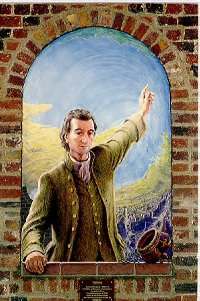See Dissecting Deism Past and Present
French Deism: deistic Humanism, Pantheism
English Deism entered France, where, however, only its materialistic and revolutionary phases were seized upon, to the exclusion of that religiosity which had never been lost in England. French Deism stood outside of theology...Their moral theories...lost all connection with the position of Deism, which became for them a mere armory of weapons for the destruction of all religion with its consequences, intolerance and moral corruption.
The English writers who came to exercise the greatest influence were Hobbes, Locke, Shaftesbury, Pope, Bolingbroke, and Hume. Of the true Deists only Collins, the most critical and the least theological, became prominent." Ref. IEP
French Deism was anti-religious and shaded into atheism, pantheism, and skepticism and in reality was better called deistic Humanism.
See French Deism, religious English Deism, and Deism Mainpage.
The "Enlightenment" was mainly a French affair. To quote, "A rational and scientific approach to religious, social, political, and economic issues promoted a secular view of the world and a general sense of progress and perfectibility. Some "philosophes" at first proposed that their theories be implemented by "enlightened despots" or rulers who would impose reform by authoritarian means."
And: "The main figures of the enlightenment are fairly well known: Descartes, Pascal, Bayle, Montesquieu, Voltaire, Diderot, and Rousseau. There were others whom we could call antagonists to the dominant note, people like Rousseau, Zinzendorf, Wesley, Vico, and Hume." It also set the stage for secular disasters such as socialism, fascism, Nazism.
French Deism
Voltaire
- Islam Versus Deism
- Left vs Right, Montesquieu, Corporatism
- Eastern Roman Empire and Islam
- Philosophies of Islam, Greece, and the West by Turgut Ozal
- Example of Islam and science.
- Maimonides Versus Aristotle and the Jews of Spain, Thirteen Rules
- Handbook on the History of Modern Science
- Pelagius and why he was right
- Islam Versus Judaism and Christianity
- Islam to Deism: Why I became a Deist
Web site Copyright Lewis Loflin, All rights reserved.
If using this material on another site, please provide a link back to my site.

